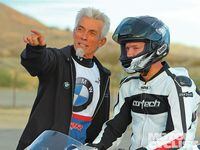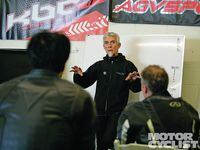Ihave the best job in the world. My time is spent identifying the problems riders have in reaching their optimum level of confidence, researching those problems, and breaking them down into bite-sized chunks of information for the riders. From there it’s a matter of coming up with hands-on drills so that riders can practice and improve. That’s my job–helping people become better riders through a better understanding of the sport.
I got this job back in the 1970s when I got tired of listening to shoddy, buzz-word advice that wasn’t worth the air blown past the vocal cords to utter it. I was looking to improve and quickly discovered that it was a quest for treasure in completely unexplored territory, and there was no map anywhere to be found. There weren’t even any enthusiast magazine riding-tip articles. If there had been an Internet, a Google search would have come up with zero results.
Things are different now. When a problem presents itself, the process of identifying the problem through research—and then deciding if it is coachable or not—is put to the test and the solution presented to our 74 qualified coaches worldwide. We can then apply the solution to thousands of riders. Rider coaching is something that many riders at all levels seek out in order to gain confidence, improve skills, and take their sport to the next level. Those who don’t are limiting their potential. Fortunately, there has been a strong cultural shift toward accepting outside instruction. It’s taken awhile, but we’re past the “I’ll figure it out on my own” phase, at least for most riders.
Coaching itself is a unique job, providing a unique service. Just as I learned to coach, I learned the process had rules and procedures that needed to be followed so that the students succeeded in getting what they came to school for. A skilled, knowledgeable coach is an invaluable resource, and even though there are coaches in most other sports, motorcycling did not have an established path for either the rider or the coach when it came to advanced training.
I had taken the new rider-training programs that were commonly available. I knew they were based on results, but not how to achieve them. What remedies do you apply when you have a tough student? How do you get someone through a problem area other than just repetitively having them do the exercises? After 36 years of developing and evolving coach training, I can now say I’ve got a handle on that.
When you look for a course, a coach or a school, first decide what you want to get out of the experience. Do you have a specific issue? Do you want better all-around skills? Do you want to be able to race? Ride on the street? Ride on the track? What skills do you think you lack? A coach will help you answer these questions, and provide insight into new skills and riding techniques that will help you. A coach can help you gain confidence in the face of uncertainty. Conquering one’s fears and achieving a higher level of control with a motorcycle is what many devout motorcyclists live for.
Every once in a while, at the end of a school day, I’ve said to the students, “You’ve now spent a day or two and hundreds or thousands of dollars on the completely frivolous activity of improving your motorcycle riding skills—was it really worth it?” No one needs to answer the question, the beaming faces say it all. The successes from training are astounding. When you exceed someone’s expectations, when someone tells you that they just had the best day of their entire life, I know that good training is the real deal. The best job in the world.












/cloudfront-us-east-1.images.arcpublishing.com/octane/VZZXJQ6U3FESFPZCBVXKFSUG4A.jpg)
/cloudfront-us-east-1.images.arcpublishing.com/octane/QCZEPHQAMRHZPLHTDJBIJVWL3M.jpg)
/cloudfront-us-east-1.images.arcpublishing.com/octane/HXOUJXQWA5HBHGRO3EMJIGFMVI.jpg)

/cloudfront-us-east-1.images.arcpublishing.com/octane/3TIWWRV4JBBOLDVGRYECVVTA7Y.jpg)
/cloudfront-us-east-1.images.arcpublishing.com/octane/KIX5O23D5NAIBGFXBN3327DKZU.jpg)
/cloudfront-us-east-1.images.arcpublishing.com/octane/7GJYDUIPXRGMTMQKN6ONYOLBOU.jpg)
/cloudfront-us-east-1.images.arcpublishing.com/octane/MUQLOVLL2ZDGFH25ILABNBXKTI.jpg)
/cloudfront-us-east-1.images.arcpublishing.com/octane/TNOU5DNE2BC57MFPMGN2EIDXAM.jpg)
/cloudfront-us-east-1.images.arcpublishing.com/octane/GTCXACQGJ5HAPDTGWUQKDEH44E.jpg)
/cloudfront-us-east-1.images.arcpublishing.com/octane/S35YGSEMEZB4BLTDJTSZPF4GLA.jpg)
/cloudfront-us-east-1.images.arcpublishing.com/octane/5UOT6HPX2JFMRJAX6EH45AR4MQ.jpg)
/cloudfront-us-east-1.images.arcpublishing.com/octane/OKWOJWAKP5EP3OACCRRWPCIX2Q.jpg)
/cloudfront-us-east-1.images.arcpublishing.com/octane/2WF3SCE3NFBQXLDNJM7KMXA45E.jpg)
/cloudfront-us-east-1.images.arcpublishing.com/octane/G4MG6OUCJNBSHIS2MVVOTPX65E.jpg)
/cloudfront-us-east-1.images.arcpublishing.com/octane/IIGGWFOTOJGB7DB6DGBXCCMTDY.jpg)
/cloudfront-us-east-1.images.arcpublishing.com/octane/QSTCM6AVEZA5JJBUXNIQ3DSOF4.jpg)
/cloudfront-us-east-1.images.arcpublishing.com/octane/U4I7G625B5DMLF2DVIJDFZVV6M.jpg)
/cloudfront-us-east-1.images.arcpublishing.com/octane/B6XD6LS6IVCQPIU6HXDJSM3FHY.jpg)
/cloudfront-us-east-1.images.arcpublishing.com/octane/ICL63FEDDRDTTMINYICCEYGMDA.jpg)
/cloudfront-us-east-1.images.arcpublishing.com/octane/FCGZHQXRBZFLBAPC5SDIQLVF4I.jpg)
/cloudfront-us-east-1.images.arcpublishing.com/octane/WNOB6LDOIFFHJKPSVIWDYUGOPM.jpg)

/cloudfront-us-east-1.images.arcpublishing.com/octane/X33NU3E525ECRHXLNUJN2FTRKI.jpg)